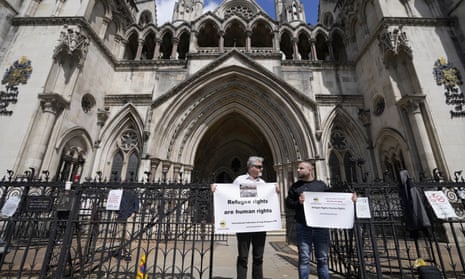A high court judge has ruled that a controversial deportation flight to Rwanda that was due to take off early next week can go ahead.
Mr Justice Swift refused to grant interim relief – urgent action in response to an injunction application made by several asylum seekers facing offshoring to Rwanda.
Lawyers acting for the asylum seekers and the groups had argued the policy was unlawful and sought the urgent injunction to stop next week’s planned flight and any other such flights ahead of a full hearing of the case later in the year.
The decision will not stop individual refugees from further legal challenges to their removal to Rwanda, or a judicial review of the policy, which Swift said could take six weeks.
He supported submissions made by the home secretary, Priti Patel, and rejected the application to halt the Rwanda flight next Tuesday, but granted permission to the claimants to appeal – suggesting court of appeal judges would hear the case on Monday.
Swift said there was a “material public interest” in allowing the secretary of state to be able to implement immigration control decisions. He also said that some of the risks of sending asylum seekers to Rwanda outlined by the claimants were very small and “in the realms of speculation”.
Patel will see this as a significant victory following concern that the offshoring plan would be stopped in the courts.
The government has claimed that the plan is designed to deter migrants from making dangerous Channel crossings and to break the business model of people smugglers.
The home secretary welcomed the court’s decision, saying: “People will continue to try and prevent their relocation through legal challenges and last-minute claims but we will not be deterred in breaking the deadly people-smuggling trade and ultimately save lives.”
Boris Johnson also welcomed the ruling, saying: “We cannot allow people traffickers to put lives at risk and our world leading partnership will help break the business model of these ruthless criminals.”
The scheme has reportedly been criticised in private by Prince Charles. According to the Times, the Prince of Wales was heard calling the policy “appalling” and was particularly displeased as to represent the UK at the Commonwealth Heads of Government meeting in Kigali, Rwanda, later this month.
Yvette Cooper, the shadow home secretary, said: “The UNHCR criticism of Priti Patel’s Rwanda scheme today is damning – warning about lack of proper treatment for refugees in Rwanda and also accusing the home secretary of misleading people on UN support for the scheme.
“Labour has made clear from the start that Priti Patel’s Rwanda plan is completely unworkable, extortionately expensive, unethical and profoundly un-British.”
The decision will not stop individual asylum seekers from further legal challenges to their removal to Rwanda and a judicial review of the policy, which Swift said could take six weeks.
In his ruling, Swift also denied interim relief to two people who face removal to Rwanda. “I accept that the fact of removal to Rwanda will be onerous,” the judge said.
Six out of eight of the asylum seekers facing offshoring to Rwanda had their removal directions deferred by the end of Friday’s hearing. Swift accepted that some of the points made by the claimants were arguable and would be aired at a full hearing in July. He said the points about the home secretary’s decision being irrational or based on insufficient inquiry were arguable. However he said the claimants case was not ‘conspicuously strong’.
Swift added that even though the memorandum of understanding between UK and Rwanda was not legally enforceable it was appropriate to take its contents into account.
The asylum seekers applied for the injunction alongside the charities Care4Calais and Detention Action, as well as the civil servants union PCS, which represents many Home Office workers, including more than 80% of Border Force staff.
The plan to offshore asylum seekers and outsource the refugee obligations of the UK, one of the richest countries in the world, to Rwanda – among the poorest – has been controversial since it was announced by government on 14 April. About 30 asylum seekers, currently being held in immigration detention centres, are due to be flown there from a secret location in the UK by an undisclosed airline on Tuesday.
It is the first of multiple legal challenges to the policy to have a live high court hearing.
The specific aspects of the policy under challenge in court were the right of the home secretary to carry out such removals; the rationality of Patel’s claim that Rwanda is generally a “safe third country”; the adequacy of provision for malaria prevention in Rwanda; and whether it complies with the Human Rights Act.
Sonya Sceats, chief executive of Freedom from Torture, said the charity was disappointed by the ruling. “But the fight is far from over,” she said. “Caring people across Britain are incensed that this government wants to send people seeking safety halfway across the world and are taking action.”
PCS said they would press on with an appeal that will be heard on Monday. Mark Serwotka, the general secretary, said the outcome was “disappointing” and called for urgent talks with Patel over how the removals will be carried out.
Enver Solomon, chief executive of the Refugee Council, said: “We have already had to directly intervene to stop young people being deported to Rwanda because they were falsely assessed as adults. We fear this is a threat to many more young people who are being wrongly held in detention, putting them at great risk.
“These are vulnerable people and scared children who are alone, many of whom have undertaken perilous journeys to come to the UK in hope of safety. No one risks their own, or family’s, life unless they are running from dangers more acute than they face on these journeys.
“The government must reflect on the initial failures of this plan, and rethink by looking to operating an orderly, humane, and fair asylum system.”
